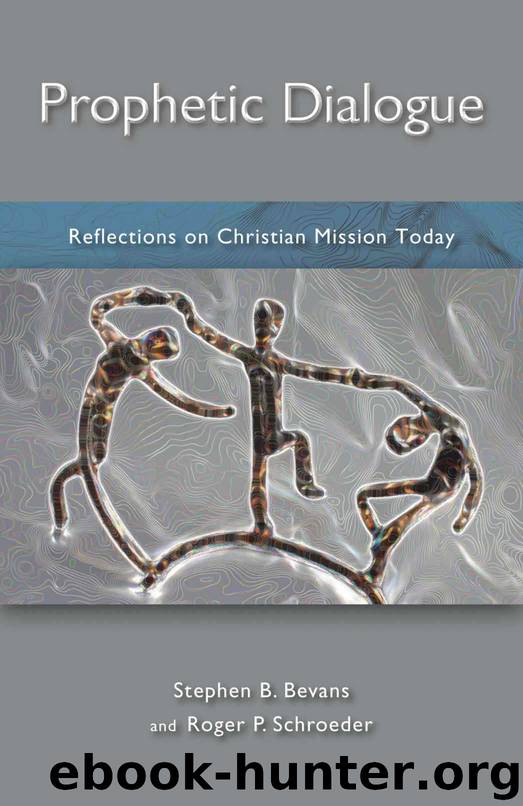Prophetic Dialogue: Reflection on Christian Mission Today by Roger P. Schroeder & Bevans Stephen B

Author:Roger P. Schroeder & Bevans, Stephen B. [Roger P. Schroeder]
Language: eng
Format: epub
Publisher: Orbis Books
Published: 2012-01-22T16:00:00+00:00
Speaking Out: The Spirituality of the Insider
The story is told about the great sixteenth-century theologian and commentator on Thomas Aquinas, Cardinal Cajetan, that he spoke of the woman who did his laundry as not just a better believer, but a better theologian. 18 Whether Cajetan was right or not, however — whether his “laundry lady” was indeed better at theologizing than he was — is not as important as the intuition that his remark expresses, the intuition that theology is first and foremost the task and activity of every Christian. “To be Christian at all is to be a theologian. There are no exceptions. ” 19 In the same way, it is true that the task of inculturation is not first and foremost the work of experts — particularly “outside” experts — but the work of ordinary people, the subjects of local social and cultural contexts. As Peter Schineller wisely says, the process of inculturation is far too complex to be left only to professional theologians, and it goes without saying that such complexity can rarely if ever be grasped by outsiders. 20 Inculturation will be achieved only as ordinary “Christian members of indigenous or traditional societies…rediscover and reclaim their cultural roots and identity, including indigenous spiritual values and rituals,” 21 when people in a context who are often ignored or discounted are able to tell their stories as blacks or Hispanics or homeless, as disabled or lay people, as women, as gay or lesbian, as Asian Americans. Authentic contextualization can take place only when the “little theologies” as well as the “big theologies” are able to be articulated. 22
As essential as it is for the real “insiders” to have a voice, the fact is that they often don't think they have anything worth saying. This is perhaps one of the worst legacies of both Western colonization and clericalism. On the one hand, years and often centuries of political domination and/or cultural denigration have left many peoples in a state of “anthropological poverty.” Anthropologist Darrell Whiteman, for example, tells the story of one of his Thai students who made the astonishing discovery in his class on contextualization that she could be genuinely Thai and genuinely Christian at the same time. She had always been told that to be Christian she needed to turn her back on her Buddhist family and denounce her culture. 23 On the other hand, people have been intimidated by church leaders who saw themselves as the only authentic interpreters of the gospel. Any kind of popular expression of faith was suspect and smacked of “syncretism.”
This is why the insiders of a particular social and cultural context need to practice a spirituality of “speaking out,” a spirituality born of an asceticism that trusts in their culture and experience and results in a courage that gives them the energy, insight, and creativity to articulate how God is present in their lives, their work, and their struggles. Given how their faith and imaginations have been formed in the past,
Download
This site does not store any files on its server. We only index and link to content provided by other sites. Please contact the content providers to delete copyright contents if any and email us, we'll remove relevant links or contents immediately.
| Adult Ministry | Children's Ministry |
| Counseling & Recovery | Discipleship |
| Evangelism | Missions & Missionary Work |
| Preaching | Sermons |
| Youth Ministry |
The Rape Of Nanking by Iris Chang(2322)
The Secret Power of Speaking God's Word by Joyce Meyer(2248)
Chosen by God by R. C. Sproul(1755)
Crash the Chatterbox by Steven Furtick(1653)
Knowing God by J.I. Packer(1429)
Habits of Grace by David Mathis(1405)
How To Be Born Again by Billy Graham(1402)
A Prophet with Honor by William C. Martin(1370)
Peace with God by Billy Graham(1312)
God's Smuggler by Brother Andrew(1216)
Confronting Christianity by Rebecca McLaughlin(1181)
Whisper by Mark Batterson(1155)
Angel Dreams by Virtue Doreen Virtue Melissa(1138)
Missionaries by Norman Lewis(1133)
The Truth War by John MacArthur(1104)
The School of Biblical Evangelism by Ray Comfort(1097)
The Poems of Rowan Williams by Rowan Williams(1068)
Do Greater Things by Robby Dawkins(1044)
Eucharistic Miracles by Cruz Joan Carroll(1016)
